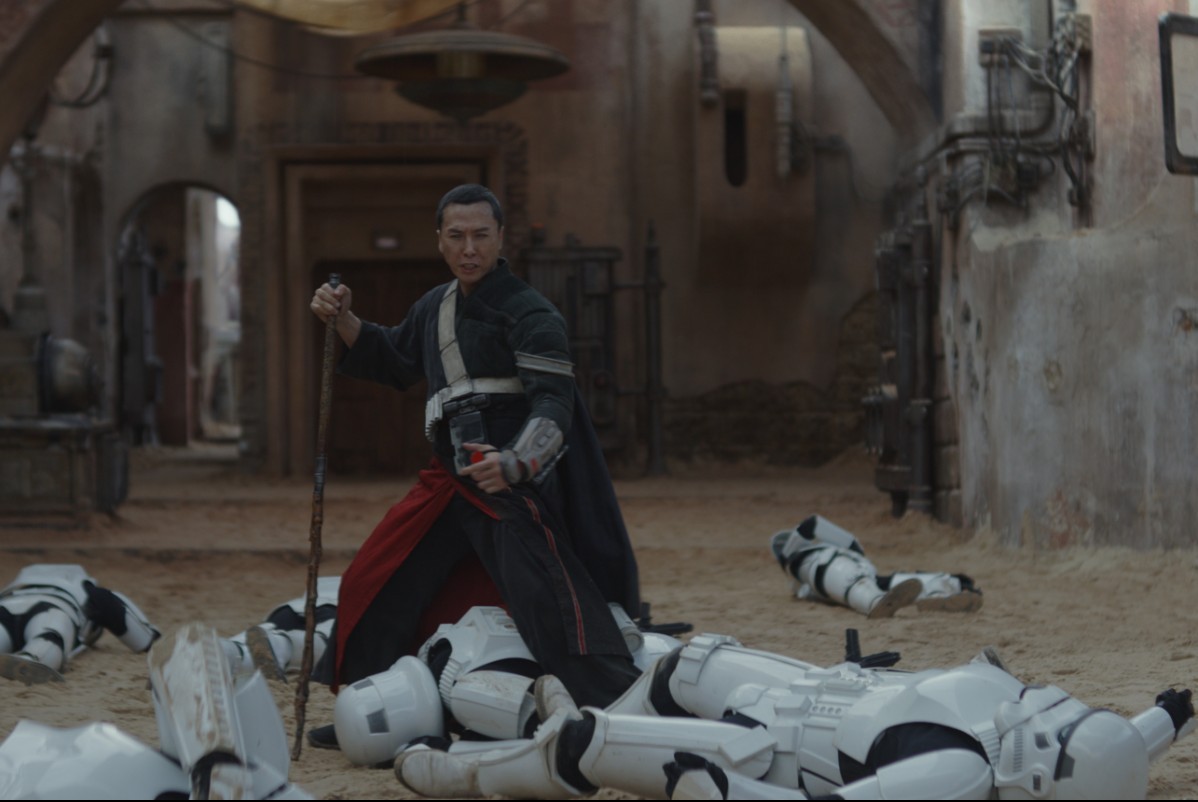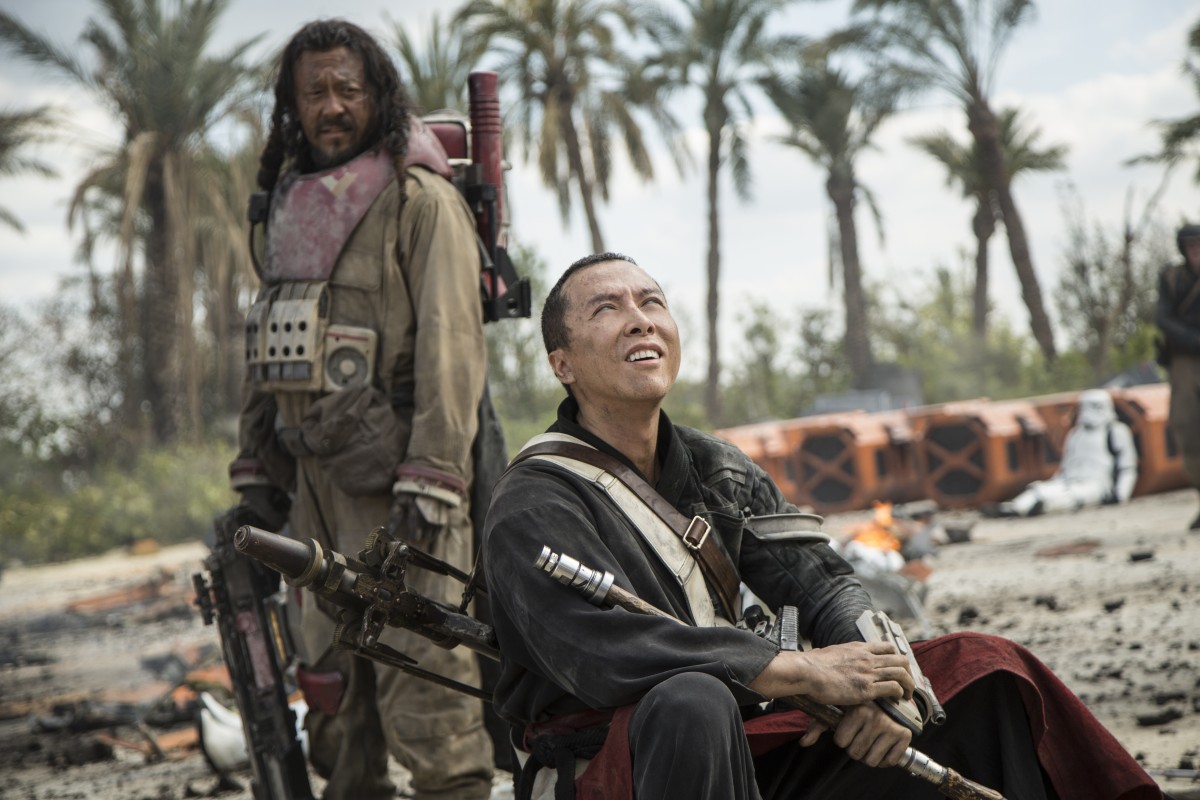Rogue One: A Star Wars Story's Donnie Yen Talks Boston Roots

Photo by Lucasfilm / ILM
A long time ago in a galaxy that’s not so far away, Donnie Yen called Boston home. As a youth, the action movie actor spent years honing his deadly moves at his mother’s martial arts school in Boston before leaving the U.S. to become one of Hong Kong’s biggest stars. Yen is now set to take Hollywood by storm thanks to his breakout role as the blind, Force sensitive warrior Chirrut Îmwe in Rogue One: A Star Wars Story. Ahead, Yen opens up about his connection to Boston, his thoughts on joining the Star Wars universe, and why he feels honored to be the franchise’s first Chinese actor.
Tell me about your connection to Boston. Do you hold the city close to your heart?
Somewhat, but I’m sorry to say it’s been a little bit. I’ve been away for so many decades and I live in Hong Kong with my family and kids. I do go back to Boston to visit my parents, but every single time I pay Boston a visit, things change a whole lot from what I remember living in Boston, the diversity of Boston, the choices of restaurants. Especially being a Chinese person, I think when I was living in Boston, they were a lot less. The feeling of just being in Boston nowadays, you have a little bit more sense of comfortableness.
Your mother, Bow-sim Mark, is an acclaimed martial artist in her own right and has become an important figure in the Boston community thanks to her prestigious tai chi school. How big of an influence was she on you?
I started off learning martial arts from her. When you have that kind of environment growing up in a martial arts family, it becomes rooted in your blood. Then of course, later on I moved on to being a martial arts star. I think also as well my father, both of them, they still are dedicated to promoting the art, promoting their culture, and building the Chinese community. I think that sense of Chinese roots, even though we lived in America, we’ve always held the values of Chinese culture. Even though I was young and obviously had a lot of western influences growing up in Boston, but still I was able to kind of retain and preserve the traditional Chinese values in me. When I came back to Hong Kong, people were a little bit surprised to find in a lot of ways that I’m very westernized, but on the other hand I’m quite traditional.

Photo by Jonathan Olley / Lucasfilm / LFL
Considering how huge and rabid the franchise’s fanbase is, did you find joining the Star Wars universe to be daunting?
I think it’s great because, as far as a filmmaker who’s been in the business for so long, I try to use my films to inspire young audiences, especially the children. Star Wars is a big family movie and, to be apart of this means I can be part of that system, that whole vehicle, and making my kids happy. I’m very proud of it. I’m also the first Chinese actor that got invited to be part of the Star Wars. As a Chinese actor, that’s a long time coming. You could not imagine this could happen decades ago. The world’s a lot closer today. We’re in a complex but diverse world. I’m glad I can represent and, hopefully when the movie comes out, it sets a great example for younger actors, not just Chinese actors. They too can achieve their goals.
Do you feel like the conversation around diversity in Hollywood puts enough of a spotlight on the continued struggle of Asian and Asian American performers?
I think, like any business, it’s market and demand. So because of the economy from China, because there are so many Chinese audiences, the market has to open up. Opportunities have to open up. Unfortunately, that has always been the case with not just Asian artists, but any minority artist compared to the mainstream white artist. That’s been a fact for many, many years. I’m not saying that it’s totally different today. We still have a ways to go, but I’m certainly glad that I can be one of the puzzle pieces that can move things forward. Hopefully, by setting this kind of example, maybe perhaps in the very near future we can enjoy the same opportunities.
In recent interview, you compared your style as an artist to how Michael Jackson ran his show in the documentary This Is It. You bring directing, choreography, and other skills to the set in addition to your acting and martial arts abilities.
I used Michael Jackson because people have probably seen the documentary and they can understand right away without going through the long process of explaining. I think this applies to any form of creative process. You have to get involved. You have to express. That’s what artistic expression is all about. It’s always making adjustments, trying it out, collaborations. If it doesn’t work, you do it this way. From an actor’s point of view, who knows more than the artist himself? He kind of has to dictate the overall performance. That performance can be martial arts or even just saying a line. It has to come from the artist himself. That’s always been my way of performing, acting, and getting the best of me on screen.
Since you’re also a musician, was Michael Jackson one of your inspirations?
Michael Jackson had an influence on all of us because we listened to his music, but I wouldn’t say that him particularly influenced me. I think everything influences me. Anyone or anything that I find inspiring that I can learn from, those are the things that influence me. It could be a person next door or a random stranger. Artists draw energies and motivations from their surroundings.
Rogue One: A Star Wars Story hits theaters on December 16.
This interview has been edited and condensed.


